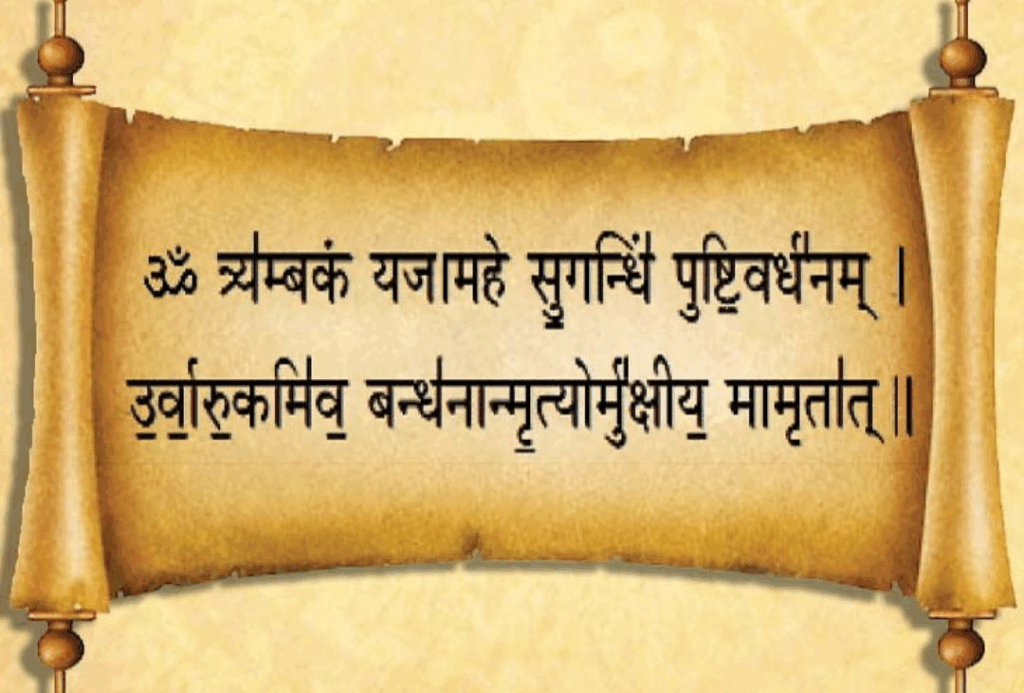The Maha Mrityunjaya Mantra, also called the Tryambakam Mantra, is a powerful Vedic chant dedicated to Lord Shiva. It is traditionally recited for protection, recovery, fearlessness, and inner renewal.

Full Mantra (English Transliteration)
Om Tryambakam Yajamahe
Sugandhim Pushtivardhanam
Urvarukamiva Bandhanan
Mrityor Mukshiya Maamritat
Alternative long form: “Om Tryambakam Yajamahe Sugandhim Pushtivardhanam, Urvarukamiva Bandhanan Mrityor Mukshiya Maamritat, Om Swaha / Om Shaantih Shaantih Shaantih.”
Word-by-Word Meaning
Simplified sense: “We worship the Three-Eyed Lord Shiva, who is the fragrance and sustainer of all life. As a ripe fruit effortlessly detaches from its stalk, may we be freed from the bondage of death and fear, and be guided to the nectar of immortality.”
Benefits of Chanting
- Protection & Courage: Cultivates fearlessness and an inner sense of safety.
- Healing Intent: Recited for recovery from illness and for overall vitality.
- Mental Peace: Steadies emotions, reduces anxiety, and encourages clarity.
- Spiritual Growth: Invokes Shiva’s grace for transformation and liberation.
- Purification: Harmonizes prana (life-force) and raises sattva (purity).
Traditional practice includes 3, 11, 21, 108, or 1008 repetitions depending on the vow (sankalpa) and occasion.
How to Chant (Simple Procedure)
- Time & Place: Early morning (Brahma Muhurta) or evening in a clean, quiet space. Light a lamp or candle if possible.
- Posture & Breath: Sit comfortably with a straight spine. Take 3 gentle breaths to settle.
- Focus: Hold a calm intention of healing, courage, and surrender to Shiva.
- Count: Use beads or a mental count. Beginners may start with 11 or 21 repetitions and gradually increase.
- Closure: After chanting, sit in silence for a minute and offer gratitude. You may end with “Om Shanti Shanti Shanti.”
Who Can Chant and When
Anyone may chant this mantra with sincerity. It is often recited during health challenges, before surgeries, on auspicious Shiva days (Mondays, Pradosh, Maha Shivaratri), during eclipses, and on anniversaries or new beginnings. Consistency is more important than large counts—regular, mindful chanting yields deep results.
Pronunciation Guide
- Tryambakam: “Try-am-ba-kam” (roll the ‘r’ lightly, ‘ya’ as in “yarn”).
- Sugandhim: “Su-gandh-im” (soft ‘dh’ like “the” in “this”).
- Pushtivardhanam: “Push-ti-var-dha-nam” (again soft ‘dh’).
- Urvarukamiva: “Ur-va-ru-ka-mi-va” (each vowel sounded).
- Bandhanan: “Ban-dha-nan” (soft ‘dh’).
- Mrityor: “Mri-tyor” (short ‘i’, ‘tyor’ like “tyore”).
- Mukshiya: “Muk-shi-ya”.
- Ma Amritat: “Ma Am-ri-tat” (short ‘a’, crisp ‘t’).
Frequently Asked Questions
1) Is a specific count mandatory?
No. Traditional counts (11, 21, 108, 1008) exist, but sincerity and regularity matter more than numbers.
2) Do I need initiation?
Initiation is not compulsory for basic practice. If you wish to undertake a large anushthana (extended vow), seek guidance from a knowledgeable teacher.
3) Can I chant for someone else?
Yes. Begin with a clear intention for the person’s well-being. You may also chant together as a family.
4) Best sitting direction?
Facing east (sunrise) or north is traditional, but a peaceful, clean space is most important.
Short Commentary on the “Cucumber” Metaphor
The line “Urvarukamiva Bandhanan” compares release from bondage to a ripe cucumber detaching naturally from the vine. It signifies a gentle, timely freedom—without violence or struggle—symbolizing a serene passage through life’s transitions and overcoming fear of death with wisdom and grace.
Chant with faith, clarity, and compassion. May Lord Shiva’s grace bring protection, healing, and inner freedom.




